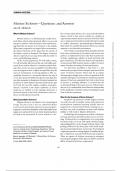zyxwvutsrqpon
COMMON QUESTIONS
Motion Sickness-Questions
Iain B. Mclntosh
What Is Motion Sickness?
zyxw
zyxwvu
Motion sickness is a debilitating but usually short-
and Answers
flict in brain input between the visual and labyrinthine
sensors, which is then read in relation to a pattern of
expected associations stored in the brain.The brain's fail-
lived illness which indiscriminately affects air, sea, road ure to match perceived and received information results
Downloaded from https://academic.oup.com/jtm/article-abstract/5/2/89/1801039 by guest on 14 June 2020
and space travelers. Only deaf mutes with nonfunction- in conflict, dissonance, and physiological disturbance.
ing labyrinths are known to be immune to the malady. Most observers consider that motion sickness is a normal
When man is exposed to an atypical force environment, response to an abnormal environment.
the delicate harmony of the input from the sensors of One widely accepted hypothesis postulates that the
the balance system is disrupted. The degree of motion brain stem mechanisms of orientation and motion may
sickness experienced can range from mild discomfort to perform an additional function other than maintenance
severe and debilitating sickness. of body equilibrium, stability of head and body, and
O f the normal population, 5% will suffer severely, gaze maintenance.This function detects and responds to
5% will be hardly affected, and the rest will suffer mod- certain poisons.With motion sickness,conflict in sensory
erately from motion sickness.A consistent research find- inputs simulates poisoning of neuromechanisms.
ing is that women are more susceptible to the illness than An alternative possibility is that there is a link
men, and appear to have a higher susceptibility near the between the perceptual motor adaptive processes and the
onset of menstruation or during pregnancy. This sus- onset of motion sickness. There may be an emetic
ceptibility increases to a maximum between the age of chenioreceptor trigger zone in the area postrema of the
12-21 years and is rare before the age of2 years.Age does medulla oblongata, incriminated in producing motion
not infer immunity to disruptions of normal motion, but sickness. It has been postulated that with certain forms
incidence of travel sickness decreases between the ages of motion, a vomiting substance is secreted into the
of 21 and 40 years. The mildest condition of motion- cerebrospinal fluid in the emetic process. Others believe
sickness is known as the Sopite syndrome, in which that an as yet unidentified neural element indispensable
symptoms are limited to some gasping, drowsiness, a for the production of motion-induced vomiting is located
decreased interest in the local environment, and a ten- close to the area postrema.
dency towards physical inactivity.
What Are the Symptoms of Motion Sickness?
What Causes Motion Sickness? Symptoms can present in variable degrees, and may
zyxwvut
Motion sickness is considered to be a physiological wax and wane and/or steadily worsen with exposure to
vertigo.The exact cause is stdl not understood despite environmental instability. Vomiting initially eases the
much research, particularly related to the space program. symptoms for a short period. Persistent vomiting over sev-
It appears to arise tiom stimulation of the labyrinthine sense eral days can result in problems in those with diabetes
organs over a period oftime in an intense manner to,whch mellitis or with renal or hepatic dysfunction.
the body is not accustomed. I t may be related to a con- Cardinal signs and symptoms are malaise, cold sweats,
yawning, abdonlinal discoiiliort, pallor, nausea, and vom-
zyxwvutsrqp
zyxwvutsr
lain B. Mclntosh, BA (Hons) MBChB.DGMRCf?DRCOG.:
Lecturer, Anxiety Centre, Psychology Department, Stirling
iting. Cardiovascular accompaniinents of a racing pulse
and tachycardia can occur with rapid, sometimes gasp-
ing, breathing.There can be changes in blood volume with
pooling of blood in the lower parts of the body, result-
ing in postural hypotension and syncope. Psychological
zyx
University, Stirling, United Kingdom, and Lecturer,Travel components present as varying degrees of withdrawal,apa-
Medicine, University of Glasgow. thy, or depression associated with functional incapacity.
Reprint requests: l.B. Mclntosh, 11 Shirra's Brae, St. Ninians, There are reports of sickness occurring in passengers
Stirling FK7 OAY, Scotland. mounting the gangway of the ship, even before untoward
JTravel Med 1998; 5:89-91. effects of motion have been experienced.
89




